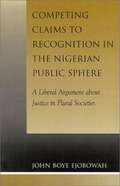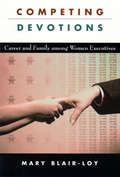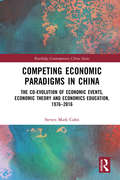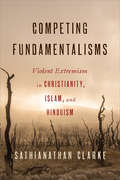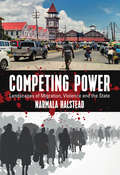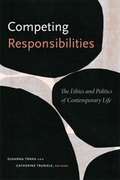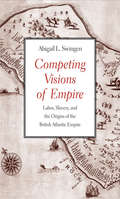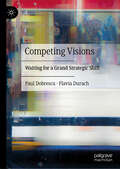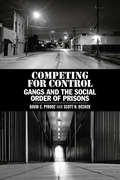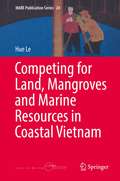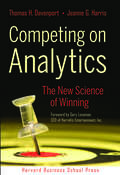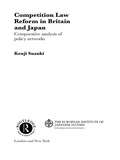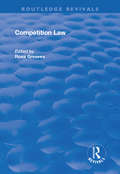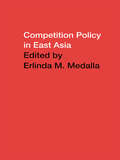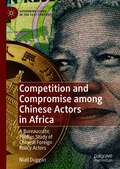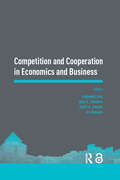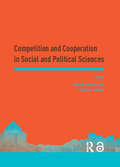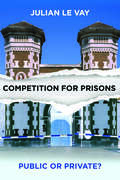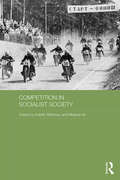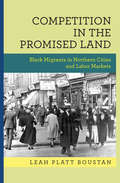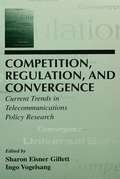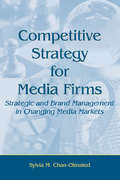- Table View
- List View
Competing Claims to Recognition in the Nigerian Public Sphere: A Liberal Argument about Justice in Plural Societies
by John Boye EjobowahA case study of multiculturalism in Africa.
Competing Devotions: Career and Family among Women Executives
by Mary Blair-LoyThe wrenching decision facing successful women choosing between demanding careers and intensive family lives has been the subject of many articles and books, most of which propose strategies for resolving the dilemma. Competing Devotions focuses on broader social and cultural forces that create women's identities and shape their understanding of what makes life worth living. Mary Blair-Loy examines the career paths of women financial executives who have tried various approaches to balancing career and family. The professional level these women have attained requires a huge commitment of time, energy, and emotion that seems natural to employers and clients, who assume that a career deserves single-minded allegiance. Meanwhile, these women must confront the cultural model of family that defines marriage and motherhood as a woman's primary vocation. This ideal promises women creativity, intimacy, and financial stability in caring for a family. It defines children as fragile and assumes that men lack the selflessness and patience that children's primary caregivers need. This ideal is taken for granted in much of contemporary society. The power of these assumptions is enormous but not absolute. Competing Devotions identifies women executives who try to reshape these ideas. These mavericks, who face great resistance but are aided by new ideological and material resources that come with historical change, may eventually redefine both the nuclear family and the capitalist firm in ways that reduce work-family conflict.
Competing Economic Paradigms in China: The Co-Evolution of Economic Events, Economic Theory and Economics Education, 1976–2016 (Routledge Contemporary China Series)
by Steven Mark CohnWhen the Chinese economic reforms began in 1978, Marxist economics infused all the institutions of economic theory in China, from academic departments and economics journals to government departments and economic think tanks. By the year 2000, neoclassical economics dominated these institutions and organized most economic discussion. This book explains how and why neoclassical economic theory replaced Marxist economic theory as the dominant economics paradigm in China. It rejects the idea that the rise of neoclassical theory was a triumph of reason over ideology, and instead, using a sociology of knowledge approach, links the rise of neoclassical economics to broad ideological currents and to the political-economic projects that key social groups inside and outside China wanted to enable. The book concludes with a discussion of the nature of economic theory and economics education in China today.
Competing Fundamentalisms: Violent Extremism In Christianity, Islam, And Hinduism
by Sathianathan ClarkeWhy do certain groups and individuals seek to do harm in the name of God? While studies often claim to hold the key to this frightening phenomenon, they seldom account for the crucial role that religious conviction plays, not just in radical Islam, but also in the fundamentalist branches of the world's two other largest religions: Christianity and Hinduism. As the first book to examine violent extremism in all three religions together, Competing Fundamentalisms draws on studies in sociology, psychology, culture, and economics—while focusing on the central role of religious ideas—to paint a richer portrait of this potent force in modern life. Clarke argues that the forces of globalization fuel the aggression of these movements to produce the competing feature of religious fundamentalisms, which have more in common with their counterparts across religious lines than they do with the members of their own religions. He proposes ways to deescalate religious violence in the service of peacemaking. Readers will gain important insights into how violent religious fundamentalism works in the world's three largest religions and learn new strategies for promoting peace in the context of contemporary interreligious conflict.
Competing Power: Landscapes of Migration, Violence and the State
by Narmala HalsteadDrawing from ethnographic material based on long-term research, this volume considers competing forms of power at micro- and macro-levels in Guyana, where the local is marked by extensive migration, corruption, and differing levels of violence. It shows how the local is occupied and re-occupied by various powerful and powerless people and entities (“big ones” and “small ones”), and how it becomes the site of intense power negotiations in relation to external ideas of empowerment.
Competing Responsibilities: The Ethics and Politics of Contemporary Life
by Susanna Trnka Catherine TrundleNoting the pervasiveness of the adoption of "responsibility" as a core ideal of neoliberal governance, the contributors to Competing Responsibilities challenge contemporary understandings and critiques of that concept in political, social, and ethical life. They reveal that neoliberalism's reification of the responsible subject masks the myriad forms of individual and collective responsibility that people engage with in their everyday lives, from accountability, self-sufficiency, and prudence to care, obligation, and culpability. The essays—which combine social theory with ethnographic research from Europe, North America, Africa, and New Zealand—address a wide range of topics, including critiques of corporate social responsibility practices; the relationships between public and private responsibilities in the context of state violence; the tension between calls on individuals and imperatives to groups to prevent the transmission of HIV; audit culture; and how health is cast as a citizenship issue. Competing Responsibilities allows for the examination of modes of responsibility that extend, challenge, or coexist with the neoliberal focus on the individual cultivation of the self. Contributors Barry D. Adam, Elizabeth Anne Davis, Filippa Lentzos, Jessica Robbins-Ruszkowski, Nikolas Rose, Rosalind Shaw, Cris Shore, Jessica M. Smith, Susanna Trnka, Catherine Trundle, Jarrett Zigon
Competing Values in Archaeological Heritage
by Stuart Campbell Suzie Thomas Liz WhiteArchaeological heritage legislation aims to ensure the best possible protection for the archaeological heritage, yet it remains the case that legislation can remain ineffective through other practical considerations. Some consideration may be legal or procedural, such as difficulties in enforcing legislation or in preventing crimes or damage or archaeological monuments. However other problems may be less obvious and harder to address, and require solutions which go much further than the simple application of the law. The aim of this volume is to address several issues surrounding the management of archaeological heritage comparing and contrasting which laws 'work' and which ones do not, and ignoring other issues which might effectively present the transplantation of an 'ideal system' to another country or political climate. Or the cultural attitudes which might prevent a law working in the legal system for which it was designed. The contributions are from various international jurisdictions and address a variety of subjects - from the protection of archaeological monuments to dealing with and controlling chance finds made by members of the public.
Competing Visions of Empire
by Abigail L. SwingenAbigail L. Swingen's insightful study provides a new framework for understanding the origins of the British Empire while exploring how England's original imperial designs influenced contemporary English politics and debates about labor, economy, and overseas trade. Focusing on the ideological connections between the growth of unfree labor in the English colonies, particularly the use of enslaved Africans, and the development of British imperialism during the early modern period, the author examines the overlapping, often competing agendas of planters, merchants, privateers, colonial officials, and imperial authorities in the seventeenth and eighteenth centuries.
Competing Visions: Waiting for a Grand Strategic Shift
by Paul Dobrescu Flavia DurachThis book presents an in-depth and provoking analysis of the current global landscape and the challenges it presents for development. Offering a unique approach examining the implications of strategic uncertainty on strategies for development, it discusses contemporary challenges to the field, particularly those relating to crisis management. Positing that we live in an age of strategic uncertainty, the authors progress the notion that crisis responses require extensive and holistic strategic deliberation vis-à-vis economic and social considerations, short-term and long-term projections, as well as evaluations of domestic and international spheres of development. Tracing the infrastructure of globalization, the book acknowledges the need for medium-term strategies for each crisis but emphasizes that they must be intricately woven into a larger unitary vision, ultimately highlighting the critical role of strategic thinking in addressing complex challenges we face today.
Competing for Control: Gangs and the Social Order of Prisons
by Scott H. Decker David C. PyroozPyrooz and Decker pull apart the bars on prison gangs to uncover how they compete for control. While there is much speculation about these gangs, there is little solid research. This book draws on interviews with 802 inmates - half of whom were gang members - in two Texas prisons; one of the largest samples of its kind. Using this data, the authors explore how gangs organize and govern, who joins gangs and how they get out, the dark side of gang activities including misconduct and violence, the ways in which gang membership spills onto the street, and the direct and indirect links between the street and prison gangs. Competing for Control captures the nature of gangs in a time of transition, as prison gangs become more horizontal and their power is diffused across groups. There is no study like this one.
Competing for Land, Mangroves and Marine Resources in Coastal Vietnam (MARE Publication Series #24)
by Hue LeThis book presents a historical and ethnographic study of changing mangrove management in northern Vietnam over the past 100 years, grounded in a case study in the Red River Delta in northern Vietnam. The book shows that three primary socio-economic dynamics have affected mangroves: enclosure movements that have restricted access by different user communities over time, such as the exclusion of women; changing valuation of mangroves and their products and services; and social and class differentiation caused by privatization of once common resources. The result of these pressures have been erosions of norms, rules, and collective action to protect and nurture mangroves, leading to widespread loss of coastal forests. Sustainable mangrove management will require attention to these dynamics to address current-day land conflicts. The book will be of interest to policy-makers, practitioners, and academics and students in forest policy, management and governance; rural livelihoods; and globalization and agrarian change.
Competing on Analytics
by Thomas H. Davenport Jeanne G. HarrisYou have more information at hand about your business environment than ever before. But are you using it to "out-think" your rivals? If not, you may be missing out on a potent competitive tool.In Competing on Analytics: The New Science of Winning, Thomas H. Davenport and Jeanne G. Harris argue that the frontier for using data to make decisions has shifted dramatically. Certain high-performing enterprises are now building their competitive strategies around data-driven insights that in turn generate impressive business results. Their secret weapon? Analytics: sophisticated quantitative and statistical analysis and predictive modeling.Exemplars of analytics are using new tools to identify their most profitable customers and offer them the right price, to accelerate product innovation, to optimize supply chains, and to identify the true drivers of financial performance. A wealth of examples-from organizations as diverse as Amazon, Barclay's, Capital One, Harrah's, Procter & Gamble, Wachovia, and the Boston Red Sox-illuminate how to leverage the power of analytics.
Competition Law Reform in Britain and Japan: Comparative Analysis of Policy Network (European Institute of Japanese Studies East Asian Economics and Business Series)
by Kenji SuzukiAs market competition replaces state regulation in many economic fields, competition policy has become an area of increasing significance. Against this background, Suzuki highlights the importance of the domestic political structure for competition policy. He does this through the comparative analysis of competition law reforms in Britain and Japan. He argues - controversially - that a country's domestic political structure should be considered a major factor in causing the reform of competition law, and rejects the established view that it is necessarily a result of changes in international economic and political conditions.
Competition Law: Volume Ii (The\library Of Essays On Antitrust And Competition Law Ser.)
by Rosa GreavesThis book was published in 2003. Competition/anti-trust law, as a separate body of law, is very much a creation of the 20th century and grew only in maturity in the latter half of that century. As developments in US anti-trust law have had, and continue to have, an important influence on the development of competition law in Europe and worldwide, articles have been selected for this collection from both sides of the Atlantic. The volume focuses on the following aspects: the objectives and nature of competition law, the scope of competition law, selected legal concepts and challenges in competition law, and the global application of competition law.
Competition Policy in East Asia (PAFTAD (Pacific Trade and Development Conference Series))
by Erlinda M. MedallaCompetition Policy in East Asia clarifies the key issues and provides a framework for understanding competition policy, looking in-depth at a number of regulated sectors for additional perspectives.Until two or three decades ago, competition and consumer protection policies were the preserve of the major developed economies like the United States, the United Kingdom and some European countries. Now competition issues are at the top of the international agenda as globalization spreads and as the operations of the World Trade Organization, the World Bank, the Asia Pacific Economic Cooperation forum and other organizations have brought about a realization that regulatory reform - and in many economies the creation for the first time of regulatory instruments for competition and consumer protection - is an imperative.
Competition and Compromise among Chinese Actors in Africa: A Bureaucratic Politics Study of Chinese Foreign Policy Actors (Governing China in the 21st Century)
by Niall DugganThis book explains why conflict exists among Chinese foreign-policy actors in Africa and argues against the concept that China has a grand strategy in relation to Africa. It does so by examining Sino-African relations by focusing on how China’s Africa policy is constructed and implemented concluding that a large number of actors are active in its formulation and implementation. The book argues that China’s Hegemonic Political Discourse (HPD), the goal of achieving a Harmonious Society and later the Chinese Dream through the Scientific Concept of Development, has dominated Chinese political discourse. It is this HPD that acts as the structural imperative that allows for collective action in the Chinese foreign-policy process in Africa rather than a Chinese grand strategy since the actors are unwilling to break the social norms of the collective process for fear of exclusion. This book will be of great interest to China watchers and those eager to understand how China's rise will impact the developing world.
Competition and Cooperation in Economics and Business: Proceedings of the Asia-Pacific Research in Social Sciences and Humanities, Depok, Indonesia, November 7-9, 2016: Topics in Economics and Business
by Lindawati Gani, Beta Y. Gitaharie, Zaäfri A. Husodo & Ari KuncoroAsia and the Pacific have become the growth engine of the world economy with the contribution of two-third of the global growth. The book discusses current issues in economics, business, and accounting in which economic agents, as individuals, entrepreneurs and professionals, as well as countries in the Asia and Pacific regions compete and collaborate with each other and with the rest of the globe. Areas covered in the book include economic development and sustainability, labor market competition, Islamic economic and business, marketing, finance, accounting standard compliances, and taxation. It will help shed light on what business and economic scholars in regions have done in terms of research and knowledge development, as well as the new frontiers of research that have been explored and opening up. This is an Open Access ebook, and can be found on www.taylorfrancis.com.
Competition and Cooperation in Social and Political Sciences: Proceedings of the Asia-Pacific Research in Social Sciences and Humanities, Depok, Indonesia, November 7-9, 2016: Topics in Social and Political Sciences
by Isbandi Rukminto Adi Rochman AchwanThe book contains essays on current issues in Social and Political Sciences, such as the issues of governance and social order; social development and community development; global challenges and inequality; civil society and social movement; IT-based community and social transformation; poverty alleviation and corporate social responsibility; and gender issues. Asia and the Pacifi c are the particular regions that the conference focuses on as they have become new centers of social and political development. Therefore, this book covers areas that have been traditionally known as the social and political areas such as communication studies, political studies, governance studies, criminology, sociology, social welfare, anthropology and international relations.
Competition and Efficiency in International Food Supply Chains: Improving Food Security (Earthscan Food and Agriculture)
by John WilliamsWhy have food crises seemingly become more frequent in recent years, compared to the last few decades? This book examines an array of different issues and distortions that are causing food supply chain dysfunction in many countries, particularly for staple non-perishable foods such as grains, oilseeds, pulses and sugar. It outlines the underlying changes that are currently occurring, which will have an influence on the direction of future food supply chains, and provides some solutions to current food security problems. Based on an analysis of total regulation in the 1950s-60s through to deregulation during the 1980-90s, as well as post-deregulation, it focuses on liberal trade and deregulation as a more successful solution to creating efficiencies in food supply chains and distribution. The author highlights a common thread of either farmers using government for vested-interest intervention, or autocratic governments seeking market and supply-chain power. The book examines the role of government after 70 years of food supply chain intervention. It discusses the role of commercial ‘trade’ markets and cluster industries and how these can quickly disintegrate when price distortions occur. The author studies both food importing and exporting countries and concludes that comingled commoditization of food has led to increased hoarding, corruption, and dependence on food aid. He argues that a competitive food supply chain that has minimum intervention is more likely to provide future food security. In conclusion the book emphasizes that adequate rewards, competition, and striving for supply chain efficiencies are the essences of sustainable food security.
Competition for Prisons: Public or Private?
by Julian Le VayA quarter of century has passed since Margaret Thatcher launched one of her most controversial reforms, privately- run prisons, and the role of the private sector in delivering public services continues to be one of the big political issues of our time. This book, by a critical professional insider, re-assesses the benefits and failures of competition, how public and private prisons compare, the impact of competition on the public sector’s performance, and how well Government has managed this peculiar ‘quasi-market’. Drawing on first person interviews with key players, including Chief Executives and prison managers in both sectors and Chief Inspectors, Julian Le Vay uses his former role as Finance Director of the Prison Service to give a wholly new analysis of comparative costs and of the impact of constant changes in competition policy. He draws out lessons from the parallel stories of the SERCO/G4S billing scandal, privately run immigration detention and the more radical approach now being taken on outsourcing probation, and looks in detail at four prisons, publicly and privately run, that ‘failed’. Concluding with a critique of the future shape of competition, he also draws some general conclusions on the way government works. This is vital reading for anyone interested in the role of competition in public services, implementation of public policy, or the state of our prisons.
Competition in Socialist Society (Routledge Studies in the History of Russia and Eastern Europe)
by Melanie Ilic Katalin MiklóssyThis book explores how the concept of "competition", which is usually associated with market economies, operated under state socialism in the Soviet Union and Eastern Europe, where the socialist system, based on command economic planning and state-centred control over society, was supposed to emphasise "co-operation", rather than competitive mechanisms. The book considers competition in a wider range of industries and social fields across the Soviet bloc, and shows how the gradual adoption and adaptation of Western practices led to the emergence of more open competitiveness in socialist society. The book includes discussion of the state’s view of competition, and focuses especially on how competition operated at the grassroots level. It covers politico-economic reforms and their impact, both overall and at the enterprise level; competition in the cultural sphere; and the huge effect of increasing competition on socialist ways of thinking.
Competition in the Promised Land: Black Migrants in Northern Cities and Labor Markets
by Leah Platt BoustanFrom 1940 to 1970, nearly four million black migrants left the American rural South to settle in the industrial cities of the North and West. Competition in the Promised Land provides a comprehensive account of the long-lasting effects of the influx of black workers on labor markets and urban space in receiving areas.Traditionally, the Great Black Migration has been lauded as a path to general black economic progress. Leah Boustan challenges this view, arguing instead that the migration produced winners and losers within the black community. Boustan shows that migrants themselves gained tremendously, more than doubling their earnings by moving North. But these new arrivals competed with existing black workers, limiting black-white wage convergence in Northern labor markets and slowing black economic growth. Furthermore, many white households responded to the black migration by relocating to the suburbs. White flight was motivated not only by neighborhood racial change but also by the desire on the part of white residents to avoid participating in the local public services and fiscal obligations of increasingly diverse cities. Employing historical census data and state-of-the-art econometric methods, Competition in the Promised Land revises our understanding of the Great Black Migration and its role in the transformation of American society.
Competition, Regulation and the Privatisation of British Rail (Routledge Revivals)
by John ShawThis title was first published in 2000. This work looks at the privatization of British Rail. It covers the competition for franchises and the regulation of those franchises. The study evaluates the extent to which the promotion of competition was an appropriate policy goal in the privatization of British rail. The book examines the rail system as a whole and looks at the prospects for the future.
Competition, Regulation, and Convergence: Current Trends in Telecommunications Policy Research (LEA Telecommunications Series)
by Ingo Vogelsang Sharon Eisner GillettThe telecommunications industry has experienced dynamic changes over the past several years, and those exciting events and developments are reflected in the chapters of this volume. The Telecommunications Policy Research Conference (TPRC) holds an unrivaled place at the center of national public policy discourse on issues in communications and information. TPRC is one of the few places where multidisciplinary discussions take place as the norm. The papers collected here represent the current state of research in telecommunication policy, and are organized around four topics: competition, regulation, universal service, and convergence. The contentious competition issues include bundling as a strategy in software competition, combination bidding in spectrum auctions, and anticompetitive behavior in the Internet. Regulation takes up telephone number portability, decentralized regulatory decision making versus central regulatory authority, data protection, restrictions to the flow of information over the Internet, and failed Global Information Infrastructure initiatives. Universal service addresses the persistent gap in telecommunications from a socioeconomic perspective, the availability of competitive Internet access service and cost modeling. The convergence section concentrates on the costs of Internet telephony versus circuit switched telephony, the intertwined evolution of new services, new technologies, and new consumer equipment, and the politically charged question of asymmetric regulation of Internet telephony and conventional telephone service.
Competitive Strategy for Media Firms: Strategic and Brand Management in Changing Media Markets (Routledge Communication Series)
by Sylvia M. Chan-OlmstedCompetitive Strategy for Media Firms introduces the concepts and analytical frameworks of strategic and brand management, and illustrates how they can be adapted according to the characteristics of distinct media products. Working from the premise that all media firms must strategize in response to the continuing evolution of new media, author Sylvia M. Chan-Olmsted offers applications of common business approaches to the products and components of the electronic media industry, and provides empirical examinations of broadcast, multichannel media, enhanced television, broadband communications, and global media conglomerate markets. This insightful and timely volume provides a thorough review of current concepts and industry practices, and serves as an essential primer for the application of business models in media contexts. As a realistic and integrated approach to media industry studies, this volume has much to offer researchers, scholars, and graduate students in media economics and management, and will be an important reference for industry practitioners.
